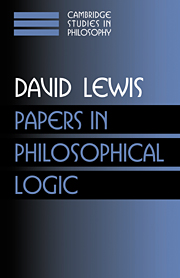Book contents
- Frontmatter
- Contents
- Dedication
- Introduction
- 1 Adverbs of quantification
- 2 Index, context, and content
- 3 ‘Whether’ report
- 4 Probabilities of conditionals and conditional probabilities II
- 5 Intensional logics without iterative axioms
- 6 Ordering semantics and premise semantics for counterfactuals
- 7 Logic for equivocators
- 8 Relevant implication
- 9 Statements partly about observation
- 10 Ayer's first empiricist criterion of meaning: why does it fail?
- 11 Analog and digital
- 12 Lucas against mechanism
- 13 Lucas against mechanism II
- 14 Policing the Aufbau
- 15 Finitude and infinitude in the atomic calculus of individuals (with Wilfrid Hodges)
- 16 Nominalistic set theory
- 17 Mathematics is megethology
- Index
3 - ‘Whether’ report
Published online by Cambridge University Press: 05 June 2012
- Frontmatter
- Contents
- Dedication
- Introduction
- 1 Adverbs of quantification
- 2 Index, context, and content
- 3 ‘Whether’ report
- 4 Probabilities of conditionals and conditional probabilities II
- 5 Intensional logics without iterative axioms
- 6 Ordering semantics and premise semantics for counterfactuals
- 7 Logic for equivocators
- 8 Relevant implication
- 9 Statements partly about observation
- 10 Ayer's first empiricist criterion of meaning: why does it fail?
- 11 Analog and digital
- 12 Lucas against mechanism
- 13 Lucas against mechanism II
- 14 Policing the Aufbau
- 15 Finitude and infinitude in the atomic calculus of individuals (with Wilfrid Hodges)
- 16 Nominalistic set theory
- 17 Mathematics is megethology
- Index
Summary
KNOWING WHETHER AND TELLING WHETHER
Mr. Body lies foully murdered, and the suspects are Green, Mustard, Peacock, Plum, Scarlet, and White. We may take it as settled that one of them did it, and only one. The question is whether Green did it, or Mustard did it, or Peacock, or Plum, or Scarlet, or White. Holmes is on the scene.
If Green did it, then Holmes knows whether Green did it or … or White did it if and only if he knows that Green did it. Likewise if Mustard did it, then Holmes knows whether … if and only if he knows that Mustard did it. Likewise for the other cases. In short, Holmes knows whether … if and only if he knows the true one of the alternatives presented by the ‘whether’-clause, whichever one that is.
Similarly for telling. In at least one principal sense, Holmes tells Watson whether Green did it, or Mustard did it, or Peacock, or Plum, or Scarlet, or White, if and only if Holmes tells Watson the true one of the alternatives presented by the ‘whether’-clause. That is: if and only if either Green did it and Holmes tells Watson that Green did it, or … or White did it and Holmes tells Watson that White did it.
This is a veridical sense of telling whether, in which telling falsely whether does not count as telling whether at all, but only as purporting to tell whether.
- Type
- Chapter
- Information
- Papers in Philosophical Logic , pp. 45 - 56Publisher: Cambridge University PressPrint publication year: 1997

